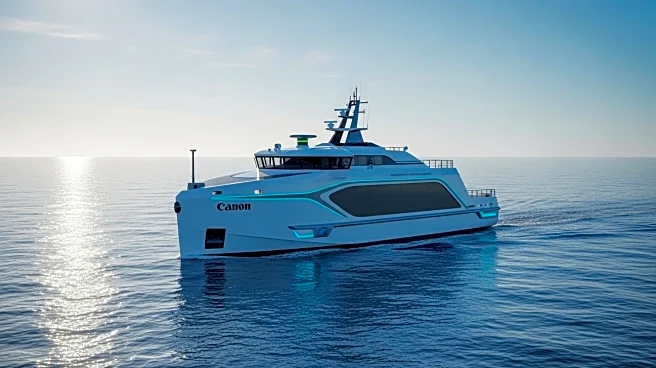What's Happening?
The American Bureau of Shipping (ABS) has awarded a statement of compliance certificate to AVIKUS Co., Ltd., for its HiNAS Control autonomous navigation system. This system is designed to optimize vessel routes and speeds, automatically controlling steering and RPMs to enhance route tracking, collision avoidance, and fuel savings. The verification framework developed by AVIKUS was assessed by ABS, HMM Co., Ltd., and the Liberian International Ship and Corporate Registry, focusing on the system's potential to save fuel and improve ship performance. The HiNAS Control system integrates various technologies, including sensors, imaging, connectivity, and machine learning, to increase safety and reduce greenhouse gas emissions.
Why It's Important?
The verification of the HiNAS Control system by ABS marks a significant advancement in maritime logistics, emphasizing the role of autonomous technologies in enhancing operational efficiency and environmental compliance. With a potential fuel savings of 4 to 5 percent, this system represents a substantial shift in profitability for the global fleet, contributing to decarbonization efforts. The collaboration between AVIKUS, HMM, ABS, and the Liberian Registry highlights the industry's commitment to innovation and sustainable practices, reinforcing the strategic importance of adopting advanced autonomous technologies in shipping.
What's Next?
The successful verification of the HiNAS Control system sets the stage for broader commercial adoption of autonomous navigation technologies in the maritime industry. Stakeholders like HMM are expected to continue integrating such technologies to strengthen their market position and enhance service reliability. The Liberian Registry's support for this initiative underscores the potential for further collaborations aimed at improving vessel efficiency and contributing to industry-wide decarbonization efforts.
Beyond the Headlines
The integration of autonomous technologies in maritime operations not only promises economic benefits but also raises ethical and regulatory considerations. Ensuring compliance with international standards and addressing potential safety concerns will be crucial as the industry moves towards greater automation. The collaboration between industry leaders and regulatory bodies will play a key role in navigating these challenges and shaping the future of maritime logistics.










